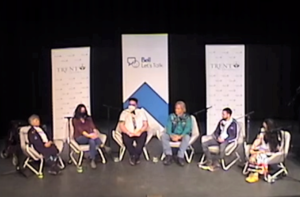Anishinaabe authors share knowledge during Trent University’s 47th Elders and Traditional Peoples Gathering

By Rick Garrick
PETERBOROUGH – Anishinabek Nation authors Elder Shirley Williams, Leanne Simpson, and Drew Hayden Taylor were among those featured during the Authors Panel at Trent University’s 47th Elders and Traditional Peoples Gathering. The Authors Panel, held on the first day of the March 10-12 gathering, also featured authors Smokii Sumac and Nathan Adler.
“There are several things that the Creator gave us, the most important one was the [Anishinaabemowin] language,” says Elder Williams, professor emeritus at Trent and Wiikwemkoong citizen, noting that she overheard three Elders speaking about how happy they were to attend the Anishinaabemowin Teg Language Conference a few years ago. “When you’re happy, when something fulfills your heart, it really lifts your heart, you feel really good. And I heard another Elder talk about the language and they said the language gives us that spirit because it was the spirit that gave us that language to speak.”
Elder Williams says she recently heard Elders talking about the Creation Story and the importance of Anishinaabemowin.
“They said, ‘Yes, the Creator has work for us because he gave us that sound,’” Elder Williams says. “That shaker, those are his thoughts, and as he drummed that, the drum is the heart, and the sound went out to the universe. So it is that sound that gave us the human being, that is the way we understand it from Anishinabek ideas and Anishinabek thought – that the language is our identity, it’s our heart, it’s our way of life. We have to be thankful for that.”
Simpson, an Alderville citizen, says the late Curve Lake Elder Doug Williams always taught her that words were powerful.
“You had to be really careful with what you said and what you shared and the stories that you told,” Simpson says.
Simpson says she was “insanely lucky” to have read Lee Maracle when she was a teenager.
“And I was able to see my experiences in writing, I was able to see my family and my life in her writing,” Simpson says. “I was able to see my family and my life and my jokes in Drew Hayden Taylor’s writing. I was able to benefit from all the hard work that someone like Shirley (Williams) has done in terms of the language, so I think it was that generation that came before me that really taught me how important this work was.”
Simpson says she also worked with Elder Doug Williams on his book, Michi Saagiig Nishnaabeg: This Is Our Territory.
“It involved a decade of us driving around and hunting or fishing or making sugar in the sugar bush,” Simpson says. “I feel really grateful now not only that he taught me that words were powerful, but that he pushed me to transcribe his stories and make that book so that there is another piece that we have as we’re moving forward.”
Taylor, a Curve Lake citizen, says the old adage is all good writers are good readers and all great writers are great readers.
“My 35th book is coming out in about five months, and I have never taken a writing course in my life,” Taylor says. “Everything I have learned about writing was directly from reading – story arc, character development. All of that was from osmosis, absorbing stories. So I always tell people, you want to be a good writer, learn what other people have done with the art before you go up and attempt it.”
Taylor says there is no such thing as a good writer, there are only good rewriters.
“I’m one of the few people that actually had a first draft of a play produced on stage and I will never do that again,” Taylor says. “I’m a firm believer that there should be at least three drafts, first for story, second for characters, and three to tie everything up.”
Taylor says he tells young people that if they want to be a writer, try to live an interesting life.
“The more interesting experiences you have, the events that you can draw on in your writing can only help,” Taylor says.


